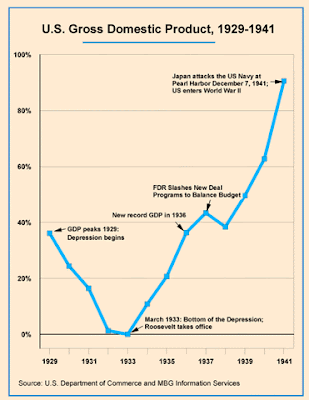"There will be no interruption of our permanent prosperity." ~ Myron E Forbes, President, Pierce Arrow Motor Car Company, January 12, 1928
"I have no fear of another comparable decline." ~ Arthur W Loasby, President, Equitable Trust Company, quoted in NY Times, October 25, 1929
"In most of the cities and towns of this country, this Wall Street panic will have no effect." ~ Paul Block, President, Block newspaper chain, editorial, November 15, 1929
"I cannot help but raise a dissenting voice to statements that we are living in a fool's paradise, and that prosperity in this country must necessarily diminish and recede in the near future." ~ E H H Simmons, President, NY Stock Exchange, January 12, 1928
"Buying of sound, seasoned issues now will not be regretted." ~ E A Pearce market letter quoted in the NY Herald Tribune, October 30, 1929
"...despite its severity, we believe that the slump in stock prices will prove an intermediate movement and not the precursor of a business depression..." ~ Harvard Economic Society, November 2, 1929
"For six years American business has been diverting a substantial part of its attention, its energies and its resources on the speculative game... Now that irrelevant, alien and hazardous adventure is over." ~ Business Week, November 2, 1929
"This crash is not going to have much effect on business." ~ Arthur Reynolds, Chairman, Continental Illinois Bank of Chicago, October 24, 1929
"For the immediate future, at least, the outlook (stocks) is bright." ~ Irving Fisher, leading US economist, early 1930
"Financial storm definitely passed..." ~ Bernard Baruch, cablegram to Winston Churchill, November 15, 1929
"The end of the decline of the Stock Market will probably not be long, only a few more days at most." ~ Irving Fisher, Professor of Economics at Yale University, November 14, 1929
"Hysteria has now disappeared from Wall Street..." ~ The Times of London, November 2, 1929
"... a serious depression seems improbable..." ~ Harvard Economic Society, November 10, 1929
"Gentleman, you have come sixty days too late. The depression is over." ~ Pres Herbert Hoover, responding to a delegation requesting a public works program to help speed the recovery, June 1930
"This is the time to buy stocks." ~ R W McNeel, market analyst, NY Herald Tribune, October 30, 1929
"There may be a recession in stock prices, but not anything in the nature of a crash." ~ Irving Fisher, leading US economist, NY Times, September 5, 1929
"There is nothing in the situation to be disturbed about..." ~ Andrew Mellon, Secretary of the Treasury, February 1930
"I think the bloom is off the rose, but there is no doom and gloom." ~ Alan Nevin, Chief Economist, California Building Industry Association.
"While the crash only took place six months ago, I am convinced we have now passed through the worst ~~ and with continued unity of effort we shall rapidly recover." ~ Pres Herbert Hoover, May 1, 1930
"[1930 will be] a splendid employment year." ~ US Dept of Labor, New Year's Forecast, December 1929
"The former great periods of prosperity in America averaged eleven years. On this basis we now have three more years to go before the tailspin." ~ Stuart Chase, American economist and author, NY Herald Tribune, November 1, 1929
"The spring of 1930 marks the end of a period of grave concern... American business is steadily coming back to a normal level of prosperity." ~ Julius Barnes, head of Hoover's National Business Survey Conference, March 16, 1930
"All safe deposit boxes in banks or financial institutions have been sealed... and may only be opened in the presence of an agent of the IRS." ~ Pres Franklin D Roosevelt, 1933
"Buying of sound, seasoned issues now will not be regretted..." ~ E A Pearce market letter quoted in the NY Herald Tribune, October 30, 1929

































